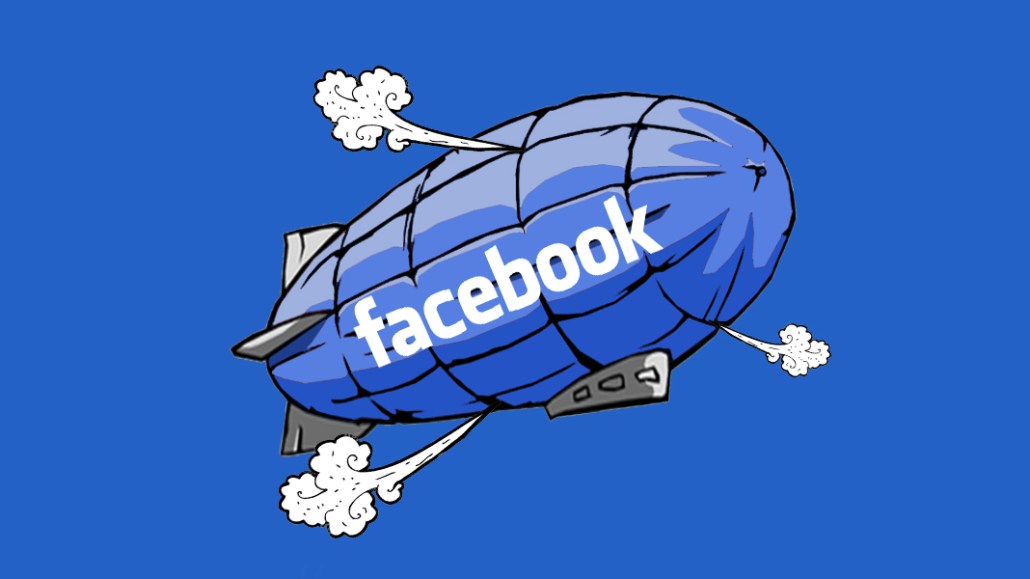Secure your place at the Digiday Media Buying Summit in Nashville, March 2-4
As online shopping intensifies, e-commerce marketers are becoming increasingly reliant on Facebook’s ads

The pandemic-induced downturn may have slowed demand for Facebook’s ads, but it also accelerated the platform’s long-running ambitions for commerce.
Facebook’s ad revenue was $16.6 billion in the second half of the year, up 28% year-over-year, though the growth of that revenue has been slowing since a year ago when it was up 42%. While the social network remains focused on keeping its ad revenue intact as the crisis unfolds, it is also trying to capitalize on the surge in online shopping that’s currently taking place in the midst of it. In the U.S., for example, retail e-commerce hit $211.5 billion in the second quarter of the year, up 31.8% in the same period the previous year, per the U.S. Census Bureau.
In recent weeks, Facebook has posted senior-level jobs in payments, e-commerce and advertising, per GlobalData. These include a business product marketing manager for e-commerce, a technical program manager for its marketplace e-commerce business, a product marketing manager for e-commerce and a director of payment partnerships for the APAC region.
The recruitment drive comes amid the launch of Facebook Shops, the social network’s latest attempt to show where it fits in online shopping. Facebook Shops is an e-commerce feature that lets businesses list products for sale across its apps via virtual storefronts. Unlike Facebook’s previous shopping products, the latest storefronts will be native to the platform.
“Many large brands with DTC offerings really value Facebook as it allows them to collect rich insights in consumer preferences and behaviors not possible on other channels,” said Clement Ma, account director at ad agency Precious.
Take the recent Facebook boycott.
It’s been nearly a month since a month-long boycott of advertising on Facebook ended for many of the world’s largest advertisers, and while there are some noticeable outliers, e-commerce advertisers weren’t among them.
To be clear, this group of advertisers extends far beyond traditional retailers to those looking to either build or extend retail businesses online. From direct-to-consumer startups to luxury brands, mom-and-pop businesses to CPG manufacturers, there are many companies that believe Facebook’s ads are indispensable in helping sell products online.
These advertisers saw Facebook as a key getaway to online shoppers, especially those Dynamic Ads that display products and info about them to users. In the second quarter of the year, spending on those ads was 20% of digital agency Kenshoo Social’s spending, up 38% on the same period a year ago.
“A trend we noticed is that media paused in July tended to be upper funnel: typically from clients that use Facebook for upper-funnel strategies, and those brand dollars were diverted to other channels or delayed for use on Facebook later in the quarter,” said John Dobrowolski, general manager of Kenshoo’s social business.” By and large, performance or direct response budgets remained intact.”
In fact, it’s fair to say that when the boycott ended, many of the e-commerce advertisers that were on the boycott let out a collective sigh of relief.
Of the 29 e-commerce advertisers that told digital agency Tinuiti to stop buying ads from Facebook throughout July, just one considered extending that ban into August. All others planned to resume their pre-boycott campaigns; some with additional spend to make up for lost media dollars in July.
These were the businesses some observers said would struggle to survive without ads on Facebook such is their dependency on the social network for revenue.
Using statistical models, researchers at Said Business School, University of Oxford estimated the boycott would see brand consideration and purchase intent for retailers fall by 25% and 8% respectively. This is because advertisers see opportunities to push media dollars much farther than just a sale, from boosting Google rankings to capturing an email for future promotions.
It’s worth noting, however, that most marketers still find it hard to say with any real confidence where any given sale came from. Some channels are good at creating sales potential, others at unlocking it like, others at both — and some are not very good at either one.
For advertisers, particularly those with e-commerce businesses, ads on Facebook not only create sales potential, they increasingly unlock it as new e-commerce features are added like the Shops in May.
“With the introduction of Shops on Facebook and Instagram, the importance of Facebook as an online sales driver is likely to increase as brands need to ensure they are delivering fantastic customer experiences on social commerce platforms,” said Ma.
More in Media

From feeds to streets: How mega influencer Haley Baylee is diversifying beyond platform algorithms
Kalil is partnering with LinkNYC to take her social media content into the real world and the streets of NYC.

‘A brand trip’: How the creator economy showed up at this year’s Super Bowl
Super Bowl 2026 had more on-the-ground brand activations and creator participation than ever, showcasing how it’s become a massive IRL moment for the creator economy.

Media Briefing: Turning scraped content into paid assets — Amazon and Microsoft build AI marketplaces
Amazon plans an AI content marketplace to join Microsoft’s efforts and pay publishers — but it relies on AI com stop scraping for free.








